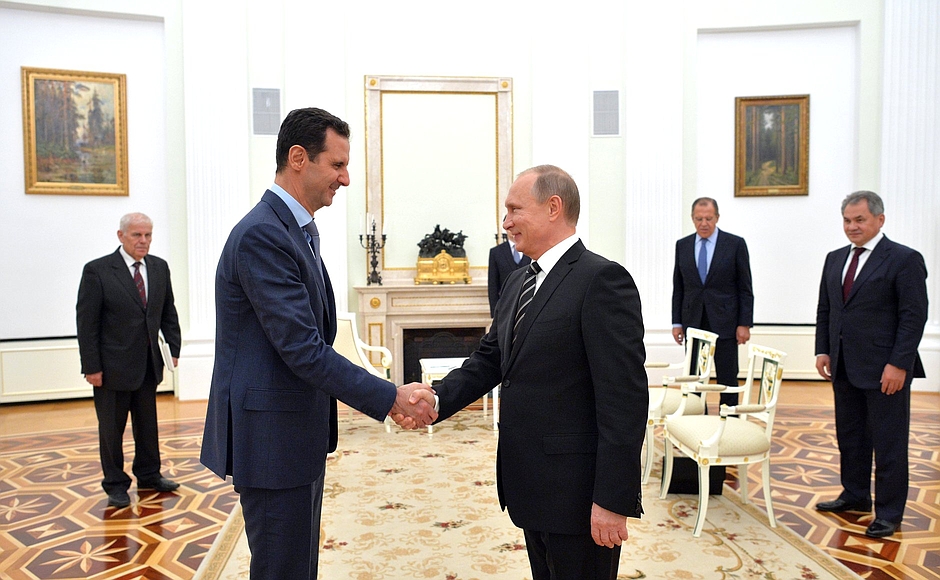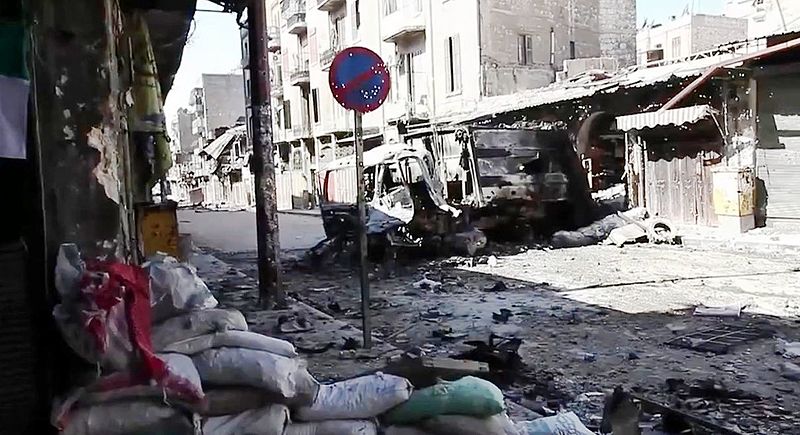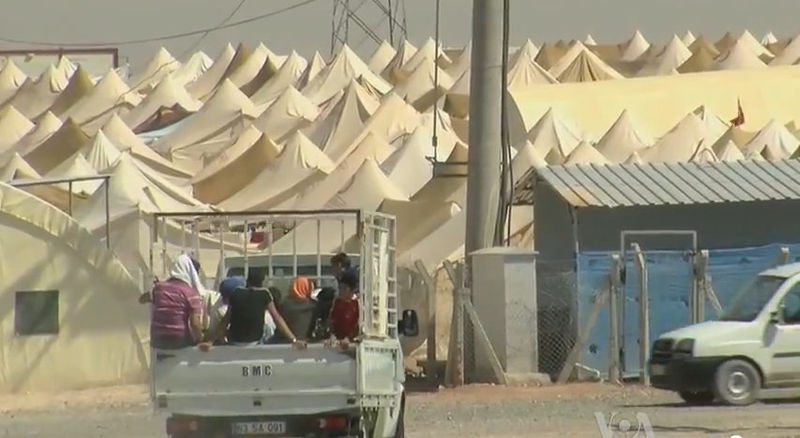Pax et Bellum | Analysis, Civil Wars, Middle East and North Africa, Violence against Civilians |
The Mass Violence Awareness Initiative (MVAI) is a non-Governmental Organization which is based in Uppsala, Sweden. It seeks to increase public awareness about incidents of past, current and possible upcoming mass violence, genocide and related phenomena around the world.
There is understandably much use of the term genocide in the discourse around Aleppo. However, when it comes to academic circles it is perhaps advisable to use terminology that more accurately describes the criminal nature of the Regime, and is harder for the Regime’s supporters to contest. Therefore, we discuss the potential applicability of other terms, including ethnic cleansing, depopulation and democide. We conclude that democide is the safest umbrella term to describe the mass violence against civilians in Aleppo.
Genocide is a term with massive power in the public sphere. In Aleppo hundreds of thousands of civilians faced an imminent threat some months ago and it is no surprise that a headline in The Guardian read: “Aleppo’s people are being slaughtered. Did we learn nothing from Srebrenica?” This comparison between current events of mass violence in Aleppo and the recognised genocide in Bosnia in 1995 serves a specific aim: raising awareness and creating a feeling of the need for action. The term genocide has been vastly politicized from the beginning due to its specific power: it can, in any given context, motivate feelings of support, sympathy or even encourage military intervention. Through history it has been used multiple times in order to draw attention to, rather than to describe, an event of mass violence. In order for someone to distinguish between political use of the term and actual genocide, in-depth knowledge is required but seldom considered.
We as a part of civil-society need how to define that which we oppose, in our case mass violence against civilians. As an NGO our aim is to contribute to that by stressing a more distinguished and precise use of different terms concerning mass violence. Are current events in Aleppo part of a genocide?
After the Second World War many different countries came together to define crimes committed by Nazi Germany. The result was the United Nations Convention for the Prevention of Genocide which defines genocide as a number of actions committed with intent to destroy, in whole or in part, a national, ethnic, racial or religious group. Many civilians trapped in East Aleppo, accused of supporting the rebels and facing systematic violence by governmental forces, used the term genocide to describe their terrible suffering under the Assad regime’s fist. From a moral perspective we are not yet in a position to pedantically discuss the terms used by these people to describe their subjection to mass violence and suffering. But what we can do is discuss Aleppo in relation to the legal and academic discussion of genocide.
Of course, the perpetrators (the Regime, Russia, Iran, Hezbollah and other Shia militias) and their supporters describe all opposition to the Assad regime as “terrorism”, or associate it with Islamist Fundamentalism with no reflection on the presence of equal numbers of Shia Islamists on the Regime’s side. This is similar to numerous historical justifications of mass violence against civilians/military operations with no regard whatsoever for civilians’ lives: Russia in Afghanistan, America in Vietnam to name just two, not to mention atrocities committed by Bashir al-Assad’s father in Hama 1982. All of the above-mentioned situations were justified as counter-insurgency actions, while their implementation and results were for sure war crimes, and arguably genocidal. The rebels, and civilians caught in the crossfire, are describing this as genocide based mainly on the ferociousness of the indiscriminate attacks on the civilian population (unarmed civilians, women, children, elders), and scattered information. But the sheer amount of violence never was nor is an adequate way to define genocide. But, as the definition given above clearly shows, the identity of the victims is.

So we can empathize with the use of the term genocide by those suffering so much, though in academic discourse there are perhaps various issues concerning its use. For example, the extent of sectarian polarization: although the vast majority of the regime’s victims are Sunni, there are Sunnis on both sides. While the survival of Sunnis under Governmental control, and (so far) of refugees from East Aleppo under regime forces would suggest that it is not a genocide of Sunnis generally, that does not mean it cannot be on a local level. Therefore, the involvement of some Sunnis as perpetrators does not necessarily diminish its genocidal intent.
But the killing of large proportions of East Aleppo’s heavily Sunni population, even disguised under “fog of war” and “collateral damage” excuses, definitely could be argued to be localized genocide: part of its population killed, including leaders/activists, and its cohesion as a (Sunni) community intentionally destroyed. At this point, it must be noted that according to the UN genocide convention, the implementation of genocide indicates that religious groups as well can be victims of such actions, so the lack of ethnic difference does not disqualify use of the term. And even if the annihilation of people is not complete, that does not disprove genocidal intent. But it is problematic to use the term ‘genocide’ as we do not yet have sufficient evidence to demonstrate beyond reasonable doubt clear intent to commit genocide. Why is stressing intent so important? Take Srebrenica as an example again: not every Bosnian Muslim was killed, but the intent was to destroy Muslims as a group in that area. Therefore it was a localized genocide.
If we can’t prove genocidal intent or the fixed identity of the victims, current violence in Aleppo needs to be defined differently. Srebrenica was a culmination of mass violence perpetrated during the on-going war in Yugoslavia. Large proportions of ethnic groups were deported under deadly circumstances, whole villages were emptied and many civilians lost their lives. To describe these actions ethnic cleansing emerged as a fitting term. The Conflict Studies scholar Benjamin Valentino defines ethnic cleansing as the effort to implement ethnic, national, or religious purification over a certain territory through removing large sections of the population by force, often resulting in mass violence.
Coming back to Aleppo, it could thus more safely be described as ethnic cleansing: the vast majority of East Aleppans have been displaced, and those evacuated may be able to leave with their lives but little else, and may never be able to return. Of course, the division in Aleppo not being entirely ethnic, but more religious, political and cultural is an issue. That said, the tactics used are the same as ethnic cleansing, so we could call it religious, cultural or political cleansing. This is related to a dilemma described by genocide scholars Tomislav Dulić and Roland Kostić. The so-called ‘ethnic security dilemma’ refers to the Yugoslav Wars, describing the fear of being subject to violence from another group within the same national boundaries, thus leading to radicalization and politicization of ethnic and religious differences. Given the ambiguity about the centrality of ethnicity in the Syrian conflict, we could talk instead about the religious or cultural security dilemma. Dulić and Kostić also mention ethnic mobilization: we could compare this to the situation in Syria (and Iraq), where we could instead talk about mobilization of Arab religious and cultural groups, and ethnic mobilization of Kurds, as the basis of the ongoing armed conflict.

In relation to these considerations, we should discuss the highly controversial term used by the Syrian government: evacuation. That covers up that the choice for anyone even linked to opposition was to leave now (during the truce) or die, making the discussion around the use of the right term a difficult and challenging task. The term “evacuation” disguises the real nature of the operation, which would be better described as depopulation (it is depopulation when there is no specific relocation plan, otherwise it can be described as resettlement, as Valentino argues), induced by state terror and indisputable mass violence. Moving the refugees en masse to Iblib could not reasonably be described as “relocation” due to the lack of any long-term plan for them, so it is indeed depopulation.
While Sunni Arab populations may still be living under the regime elsewhere like Latakia, Damascus and even West Aleppo, this does not mean that the emptying of East Aleppo’s Sunnis is not an example of localized cleansing.
Furthermore, conflict scholars discuss, as an example of atrocity, brutal, indiscriminate or even genocidal counter-insurgencies, which show no regard for civilian lives, or which even actively target civilians as part of their campaigns. So we can see Assad’s campaign in Aleppo in this light, as an example of an ultra-brutal counter-insurgency. As at the very least, the Assad regime was and is willing to kill any number of civilians in regaining its control, and the evidence would suggest intent to kill civilians.
As we can see, defining genocide and ethnic cleansing needs a lot of elaboration and in-depth analysis based on detailed information that we currently lack. Civil society is not necessarily capable of gaining access to this information, as we witness in Syria at the moment. But with this in mind, how can we define the violence in Aleppo? In 1998 the political scientist Rudolph Rummel created the term democide, referring to many atrocities committed by states in the 20th century, which applies perfectly to the events in Aleppo. A democide is “the murder of any person or people by their government, including genocide, politicide and mass murder“. By using this term to describe mass violence in Aleppo we are able to overcome the problems above. So it is a safe umbrella term.
So to conclude, there is understandably much use of the term genocide in the discourse around Aleppo, but when it comes to academic circles it is perhaps advisable to use terminology that more accurately describes the criminal nature of the Regime, and is harder for the Regime’s supporters to contest.
Jacob Agee, Jason Giannakis and Timo Leimeister
The blog is run independently of the Department of Peace and Conflict Research in Uppsala. The Pax et Bellum Editorial Board oversees and approves the publication of all posts, but the content reflects the authors’ own perspectives and opinions.
REFERENCES
- Dulić, Tomislav and Kostić, Roland. 2010. “Yugoslavs in Arms: Guerilla Tradition, Total Defence and the Ethnic Security Dilemma.” Europe-Asia Studies 62 No.7, 1051-1072
- Rummel, Rudolph. 1998. Statistics of Democide: Genocide and Mass Murder Since 1900. Münster: LIT Verlag Münster.
- Valentino, Benjamin. 2004. Final Solutions: Mass Killing and Genocide in the Twentieth Century. Ithaca and London: Cornell University Press.

